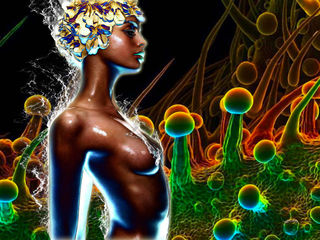Why the Clinical Use of Psychedelics May Heal Sexual Trauma
Why the Clinical Use of Psychedelics May Heal Sexual Trauma
Recent research indicates that psychedelics can increase openness traits.

Source: Acronym TV, labeled for reuse, Vimeo
Most people associate psychedelics with illicit drug use and 1960s era free-spirited optimism. At the time, the psychiatric establishment was busy studying the mind-enhancing aspect of psychedelics, and most of the prominent LSD advocates, such as Dr. Timothy Leary were respected psychiatrists. Since then, psychedelics have fallen out of favor; LSD was made illegal in 1966, and most of the others followed suit in the early 1970s with the passage of Richard Nixon's Controlled Substances Act. Currently, most psychedelics, including LSD, psilocybin, MDMA, and peyote are considered Schedule I substances, meaning they are considered by the government to have little medical value and high risk for abuse. However, times are changing again, and it is incorrect to assume that these same psychedelics have been placed in the dustbin of psychological history. Many folks don't realize that in psychiatric research, psychedelics are making a comeback.

Source: Entheogenic Garden, by new 1lluminati, labeled for reuse, Flickr
The Johns Hopkins study found that even "at 6-month follow-up, these changes were sustained, with about 80% of participants continuing to show clinically significant decreases in depressed mood and anxiety. Participants attributed improvements in attitudes about life/self, mood, relationships, and spirituality to the high-dose experience, with [more than] 80% endorsing moderately or greater increased well-being/life satisfaction."
According to the NYU study, "Psilocybin produced immediate, substantial, and sustained improvements in anxiety and depression and led to decreases in cancer-related demoralization and hopelessness, improved spiritual well-being, and increased quality of life. At the 6.5-month followup, psilocybin was associated with enduring anti-anxiety and anti-depressant effects (approximately 60–80% of participants continued with clinically significant reductions in depression or anxiety), sustained benefits in existential distress and quality of life, as well as improved attitudes towards death."
Similarly, MDMA has also shown to be highly effective in clinical research on PTSD. The Multidisciplinary Association for Psychedelic Studies (MAPS), an advocacy organization for the medical use of psychedelics, sponsored research with 130 PTSD patients. War veterans struggling with PTSD reported a significant reduction of symptoms after MDMA-assisted psychotherapy, in which they had psychotherapy sessions in real-time while experiencing MDMA. According to one such study, "after three doses of MDMA administered under a psychiatrist’s guidance, the patients reported a 56 percent decrease in the severity of symptoms on average. By the end of the study, two-thirds no longer met the criteria for having PTSD. Follow-up examinations found that improvements lasted more than a year after therapy." Clearly, psychedelics appear to be an untapped resource in the treatment of a wide variety of mental health conditions
Let's go back to psilocybin, as the most interesting finding for the
purposes of this article was that psilocybin showed a positive change in
expanding the psychological trait of openness to new experiences. As I've written about before, psychologists currently divide personality into five key dimensions, using the acronym OCEAN- Openness to new experiences, Conscientiousness, Extroversion, Agreeableness, and Neuroticism. Openness and comfort with sexual exploration are likely correlated to the personality trait of openness. In one psilocybin study, in particular, 61 percent of 51 participants demonstrated a lasting and measurable change in openness.
 Why this is extremely important is that individuals that have suffered trauma often close down, as their world shrinks due to fear and anxiety. Those who have suffered sexual trauma,
often close down sexually. Their bodies may tense up, and rather than
being able to surrender to the moment, they enter a sexual encounter
with extreme hypervigilance. In this way, trauma changes personality.
Why this is extremely important is that individuals that have suffered trauma often close down, as their world shrinks due to fear and anxiety. Those who have suffered sexual trauma,
often close down sexually. Their bodies may tense up, and rather than
being able to surrender to the moment, they enter a sexual encounter
with extreme hypervigilance. In this way, trauma changes personality.
What this new research suggests is that the clinical use of psilocybin may change personality traits back in a way that reduces some of the negative personality changes experienced due to PTSD. Specifically, more openness may allow the individual to take more risks and feel more comfortable in situations that they previously would have been too avoidant to even try.

Source: psychedelics and sex, labeled for reuse, Flickr
What this new research suggests is that the clinical use of psilocybin may change personality traits back in a way that reduces some of the negative personality changes experienced due to PTSD. Specifically, more openness may allow the individual to take more risks and feel more comfortable in situations that they previously would have been too avoidant to even try.

